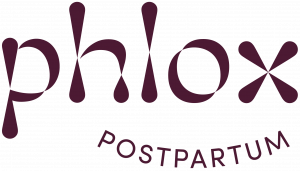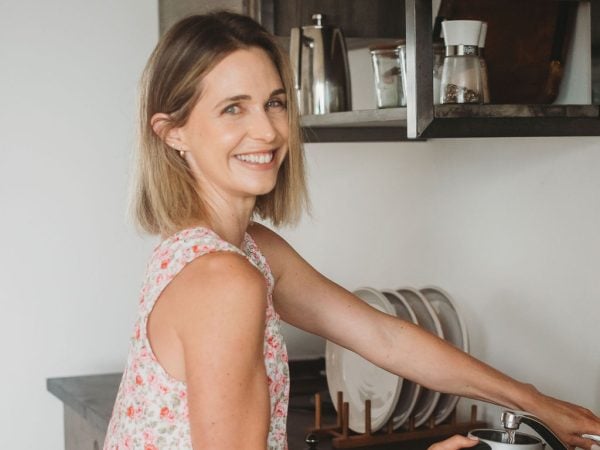The Pillars of Postpartum Care
What many women don’t know is that the three months after your baby is born are just as important as the earlier three trimesters. You need at least as much, if not more attention and care as you did when your baby was in the womb. And when we respect our real and unique needs during the fourth trimester, we set ourselves up for a return to radiant health
– Kimberley Ann Johnson
There is a belief in Ayurveda (the science of life) that the first 42 days after birth, will impact the next 42 years of your life. This time truly is a time to be soft, gentle, inward and supported. There is evidence to suggest that Mothers who protect this space and allow themselves to heal and rest are at a lower risk for postpartum depression and anxiety. In Australia this time frame is marked by the 6 week check up. We know that women have very specific needs in this time, emotionally, mentally and physiologically, however we rarely provide the tools to support this
great transformation.
If you’re wondering about the “Pillars of postpartum care” and how you can set these up for yourself, keep reading.
Extended Rest
Physically there is a lot happening in the first six to eight weeks. This is the time when Mothers uterus is contracting after the baby is born, which is one of the fastest physical changes a human experiences. 9 months to grow and around 6 weeks to return to size.
The bleeding that occurs as the uterus returns to size is also due to the dinner plate size wound that is healing inside the uterus.
Typically, Mothers lose about 1/10th of their blood as this wound heals. This is a time for deep and prolonged rest so you can maximise healing and reduce risk of infection or haemorrhage.
Layer in the hormones, emotional exhaustion and vulnerability that Mothers are experiencing, and it really highlights how very important rest is. Take it seriously, take the time to rest and you’ll be able to experience more joy in the later months.
When we think about rest in Motherhood, it is important not to think rest equals sleep. Sleep is an element of new Motherhood that we don’t have a lot of control over. Sleep when the baby sleeps is a saying that is frustrating to hear for many new Mums. But, rest, rest, rest – this is something we can do!
The key is to outsource as many of the domestic duties as possible and protect your mental and physical space.
Types of Rest
Physical
Limiting movement or moving slowly and intentionally to restore flow in your body. Physical rest includes spending time laying down, if you are on the couch, get your feet up, that’s when rest is happening. Laying down with legs up the wall for five minutes. Gentle stretching. Restorative yoga (in later months). Massage, acupuncture. Allowing your body to rest, outside of sleep.
Mental and emotional rest
The mental load in new Motherhood, or Motherhood again can be an all consuming experience. Things to do, things to remember, lists to write,people to message, reminders to set and so it goes on. Intentionally stopping the mental note taking is a practice that can be valuable throughout Motherhood. Some find guided meditations helpful, others learn a meditation technique. Journalling is another popular and useful tool to get out your thoughts and feelings and work through them. It can feel like another thing to do, but it is one that is worth the effort and can become a part of your everyday self care.
Sensory and social rest
Noise, screens, conversations, constant ‘on the go’. Without sensory and social rest, you can become depleted very quickly. Be mindful of allowing time in your day for quiet, slow space. Time to watch your baby. Time to connect with your breath and check in on yourself and your needs, honouring the portal that you are in the midst of.
Some things to consider before babe arrives:
- How will I create space to rest?
- If I can’t sleep, what can do to still rest?
- What books, TV, Movies will I have on hand so I can lay down on the couch as much as possible?
- What can I do to create a beautiful cosy space I want to rest in all day?
Warmth
Warmth required during postpartum, is both physical and emotional. To support rest and healing, warmth in a physical sense – socks on, heat packs for Mothers neck, shoulders and uterus, warm foot soaks, lots of blankets!
On an emotional level, this is creating a soothing environment. Allowing the space to be soothing and nurturing, think candles, soft lighting, cosy created spaces for Mum and baby, a postpartum nest, a space you feel supported by, indulgent in. Creating a warm space (physical and emotional) is a great oxytocin boosting tool which will support Mothers in breastfeeding, recovery and the emotional rollercoaster of new Motherhood.
Think: socks, warm drinks, warming foods, long hugs, best friends, cosy nooks, sunshine
Support
Having a well rounded support network will have a positive impact on your wellbeing and will allow you the space to transition into Mother or Mother again. Fortunately, we don’t have to rely solely on family and friends, support networks come in all forms, and can include hired help.
Consider selecting two support options from the below categories and sticking your support list to the fridge to remember whats available to you.
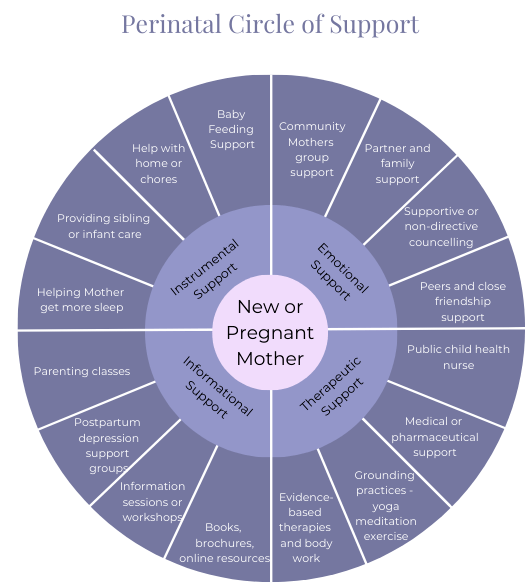
Nourishment
The transition to motherhood requires us to honour the deep healing that needs to occur when a mother births a baby. To fully recover, nourishment from food, fluids and bodywork will enable your body the deep restoration it needs.
Nourishment is both nutrient dense foods and bodywork that will support your physical recovery as well as your emotional journey.
After birth, the last thing you want to be doing is cooking and thinking about what to eat. Your digestive system is sluggish. It could take up to 14 days to get your bowel movements back to regular rhythms. Your organs have been squeezed and moved, and subsequently they will take time to get back to their full potential.
During this time, you can support your digestive system by favouring foods that are soft, cooked, warm (or at least room temperature) easy to digest, sweet, oily and nutrient dense. The quality of your food, additional calories, food that will aid healing (like collagen and iron rich options) and food that has been prepared lovingly by others are ideal to support your breastfeeding journey, your postpartum healing and your physical recovery.
Recipes to consider will be ones that can be easily frozen and reheated, snacks that can be eaten one handed as an easy grab and sit option with a cup of herbal tea.
Consider making double meals each time you cook, in the weeks leading up to birth, that way you’re filling your freezer as you go and will have plenty of meals ready to enjoy postpartum.
Physical Touch/Body work
A lot of Mothers tell me they feel touched out both physically and mentally as they transition through the postpartum portal.
Bodywork, and physical touch can help support this feeling, as well as supporting your physical recovery in postpartum.
All Bodywork (excluding deep tissue massage) is suitable to assist you in moving excess fluid, supporting your muscles as you adjust to feeding and carrying a baby, supporting your posture and allowing deep rest.
Physical touch is also a warming experience. Receiving touch from another person can help you drop into your body, and allows your Nervous System to regulate, giving you a sense of being safe and loved.
Abhyanga Oil Massage by a professional or yourself!
Foot soak and foot rub from a close friend
Shoulder and neck massage by your partner
Shower followed by self massage
Osteopathy
Postpartum Massage
Hello, I’m Ashley – postpartum doula at Phlox Postpartum
I’m a Mum of two, passionately supporting Women in their transition to Motherhood or Motherhood again. I believe that postpartum and Motherhood can be joyful experiences, and that we need support and education to soften the landing and harness the joy.
For the Mothers and Mothers to be who might be curious about Postpartum support, you can find me online at Phlox Postpartum (www.phloxpostpartum.com) or on Instagram @Phlox.Postpartum
Postpartum is forever. It’s never too late to enlist help
You may also be interested in...

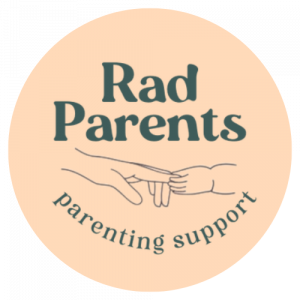
Rad Parents
Hi, I’m Claire! I’m a perinatal counsellor, parenting cheerleader and mother. I’ve worked with hundreds of parents struggling in silence and it’s my mission to make early parenthood way more fun and way less sh*t.
I understand how it feels to doubt yourself, as a parent, and to struggle mentally, feeling like you’ve lost yourself. I’ve been there too.
Through compassionate counselling or birth debriefing, I can help you work through the ups and downs of life as a parent, and find heaps more confidence and self-compassion.
I also run an epic postpartum preparation and support program called Beyond Birth, and offer evidence-based, holistic parenting support once your little one arrives.
I believe parenting is too difficult and too beautiful to do alone. I’d be honoured to be part of your village of support.
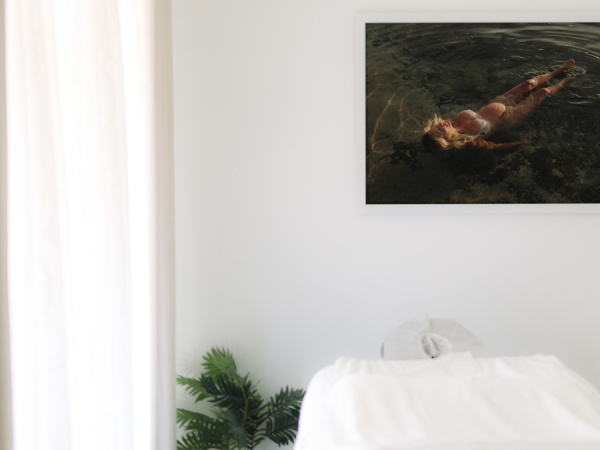
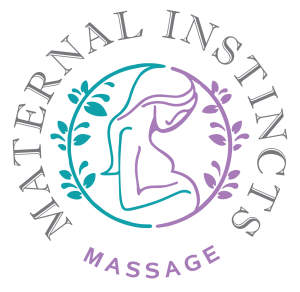
Maternal Instincts Massage
Maternal Instincts is an award winning pre and postnatal massage therapy service, that truly understands the specific treatments that expectant and new mothers need.
Our Postnatal treatments help to give relief to neck and shoulder tension that develops from feeding (breast or bottle) as well as back pain as a result of delivery or from the extra sitting to feed and the bending associated with newborns. We are also trained specifically in c-section scar massage to help aid in recovery.
Our treatments are fantastic at helping mums gain some much-needed rest and “me time”. However, babies are always welcome at these treatments and feeding/ skin to skin time can definitely be accommodated – especially if mum and bub don’t get a chance for much bonding at home.
At Maternal Instincts Massage we specialise in helping women regain their confidence and comfort through massage therapy and innovative treatments. Now, we’re excited to also offer you a non-invasive pelvic floor solution that can address the core issues of bladder leaks and sexual health: Emsella. Whether you’re dealing with postpartum incontinence or simply want to improve your pelvic health as you age, Emsella can help you regain control and feel empowered in your own body
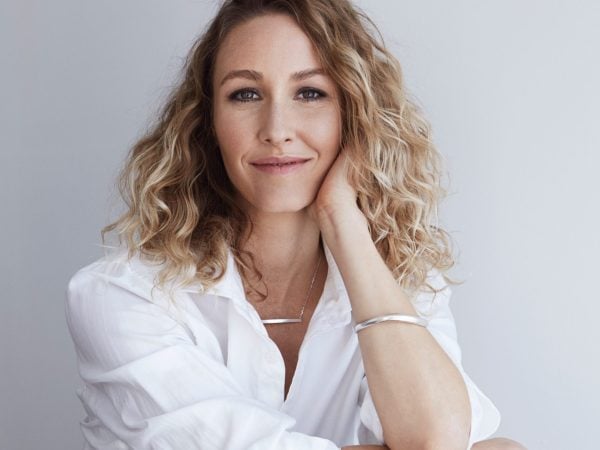
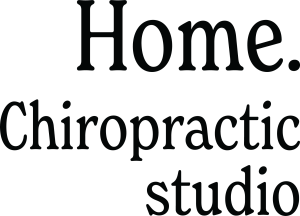
Home. Chiropractic Studio
Hi, I’m Dr. Erin Hawken, a passionate Chiropractor dedicated to supporting mothers, babies, and families in their journey to a calm, clear, connected and resilient life. Having completed my postgraduate study in Chiropractic care for pregnancy, babies and children and being certificatied in the Webster technique, I have almost 20 years experience in looking after families through all the important times in life.
My journey in chiropractic began in my own family, where regular Chiropractic care was our first approach to health. This lifelong experience taught me that Chiropractic is more than just treating symptoms – it’s about creating a pathway to better living, healing, and connection.
I care for people with many different needs including:
- Newborns struggling with constipation, feeding issues, or reflux
- Mothers experiencing pregnancy-related discomfort or simply wanting to optimise their body for birth and beyond
- Children struggling to meet their developmental milestones
- Families seeking holistic health and stress management
- Professionals dealing with stress, sleep issues, energy and mood challenges
My gentle, compassionate approach focuses on helping your nervous system change gears into your parasympathetic, rest & digest state – this is where your body can truly regulate and regenerate itself. This state is crucial for healing, development, creativity, and even experiencing deeper connections with yourself and your loved ones.
Whether you’re an expecting mother, a new parent, or simply someone seeking a more balanced, resilient approach to health, I’m here to support you. My goal is to help you rediscover life through a healthier body and a more clear, connected state of being. Let’s work together to unlock your body’s incredible potential for healing, growth, and well-being.
Learn about the support you didn't know you needed.
We have cherry picked the most useful resources for your fourth trimester so that you don't have to waste precious hours searching.
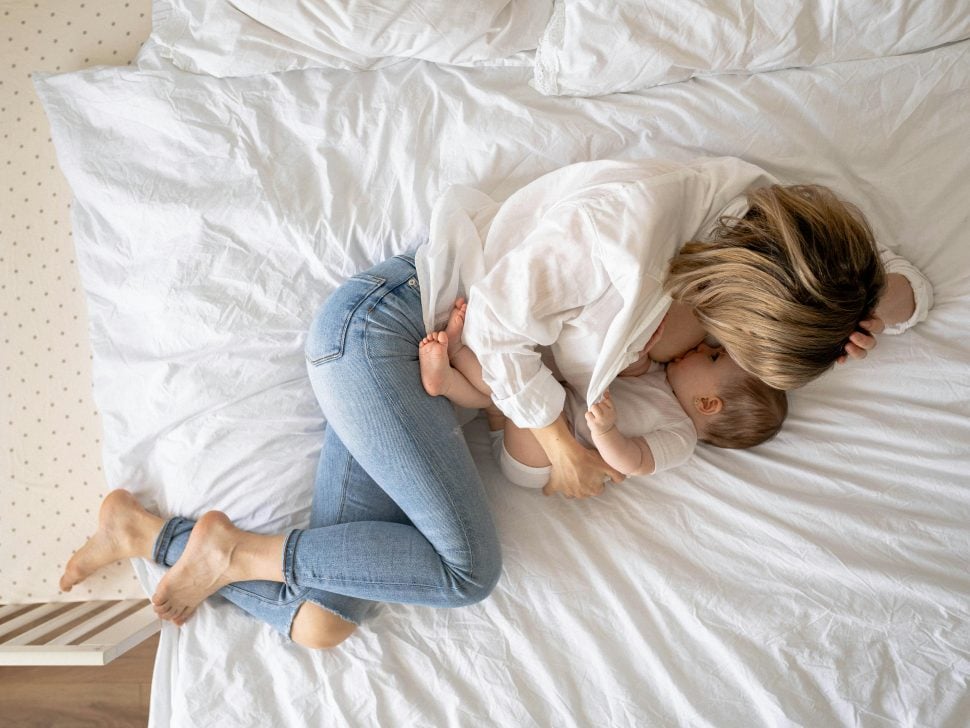
Article - Elise Clement (Psychotherapy & Coaching)
Managing Emotions as a New Mother
Managing emotions as a new mother can be tough. This post shares simple tips to help you process feelings, set boundaries, and support your well-being. Early motherhood is an emotional rollercoaster. This post shares practical tips to help you process feelings and nurture your well-being.
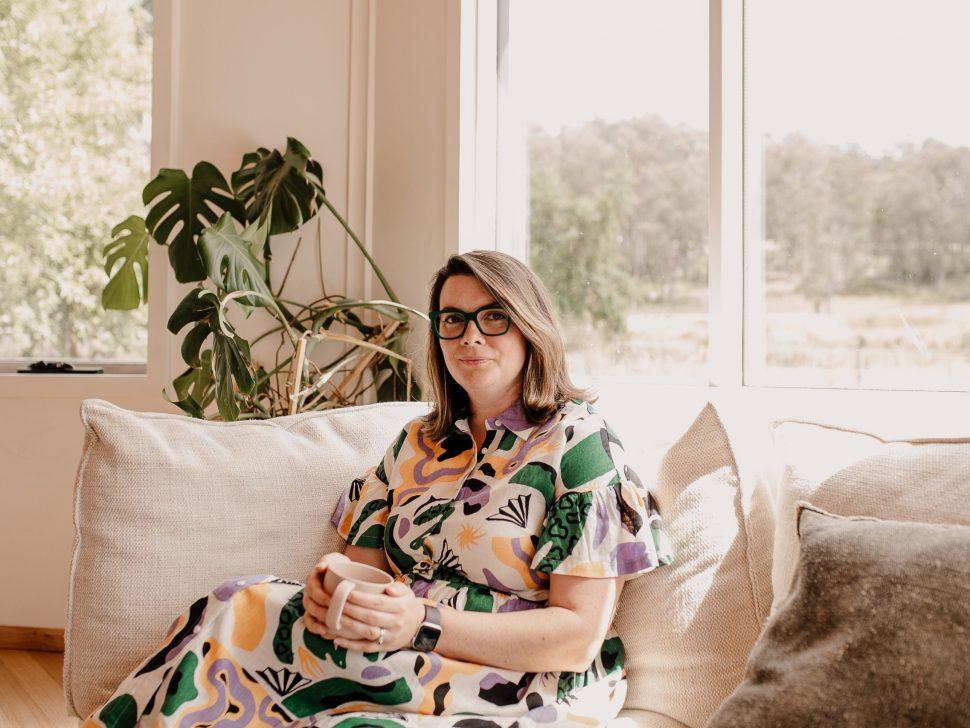
Watch - Elisha Wildblood and Louise Barton - (Not Another Onesie)
In Conversation With Dr Renee White from Fill Your Cup
Untethered: the raw truth of identity shift in motherhood.
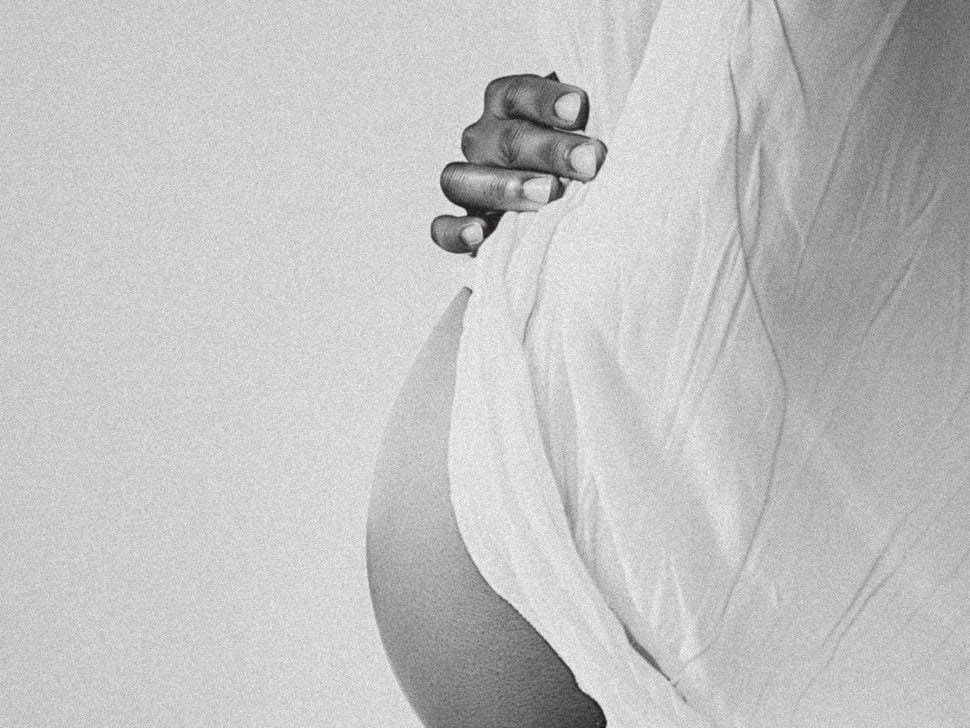
eBook - Louise Barton + Elisha Wildblood ( Not Another Onesie)
Mama’s Guide to Prepping for Pregnancy, Birth & Beyond
Mama’s Guide to Prepping for Birth, Pregnancy & Postpartum is your ultimate pregnancy and postpartum guide designed to help you feel informed, supported, and ready for every stage of motherhood. Covering key topics for each trimester, birth preferences, a hospital bag checklist, breastfeeding tips, and essential postpartum care, this downloadable PDF is packed with expert-backed advice and practical tools.
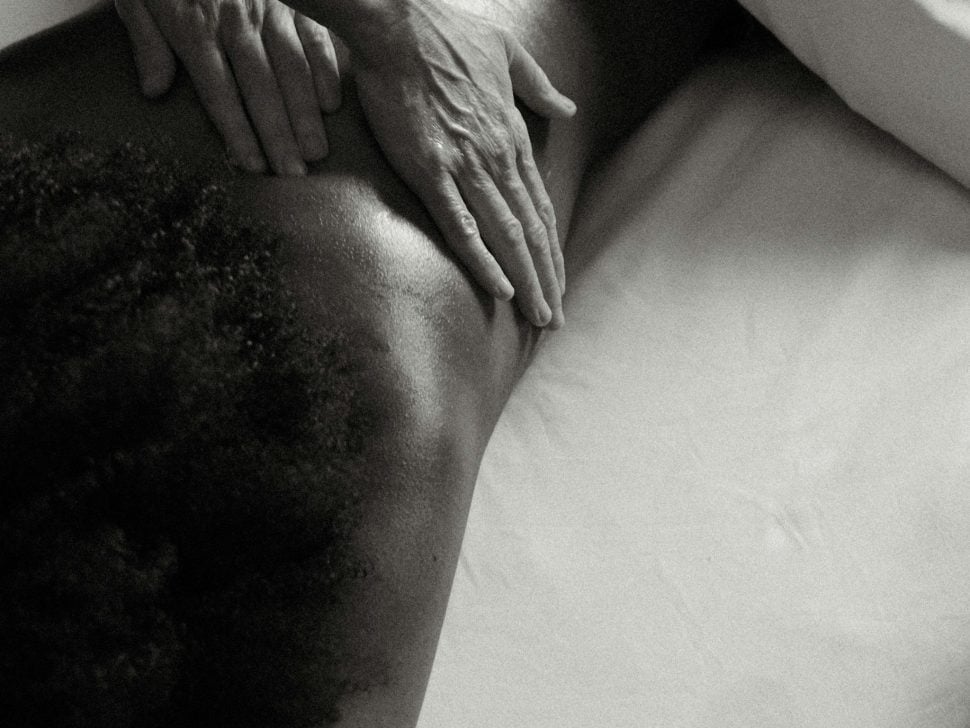
Article - Jackie Gorman ( Nurture By Touch)
Jamu Postnatal Massage: The Nurturing Tradition Every New Mother Should Experience For Deep Recovery
This is truly special to witness; it's a real privilege. As I’m within the sanctuary of the family's home for up to 4 weeks, you subtly and gratefully become part of the furniture, quietly and respectfully. So as the days pass through this ancient lineage of care, you see things shift physically, which is pure biology to me, but also her smile changes as you walk through the door, her eyes are more vibrant and her skin colour changes

Article - Louise Barton & Elisha Wildblood (Not Another Onesie)
Motherhood & Friendships – Why Everything Feels Different & How to Navigate the Change
The shift in friendships after having a baby is real, and it’s something almost every mother experiences. Let’s dive into why friendships change after motherhood, how to navigate the emotional shifts, and ways to find a new support system that actually fits your life as a mum.

